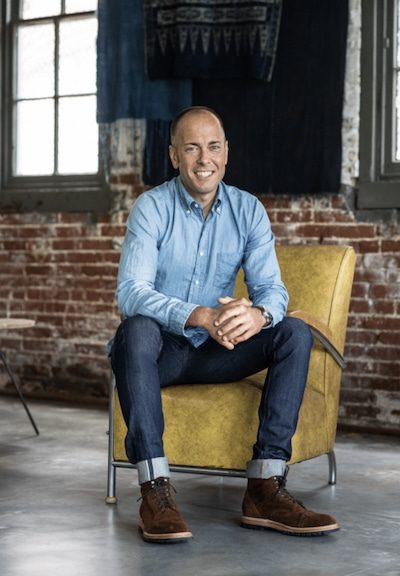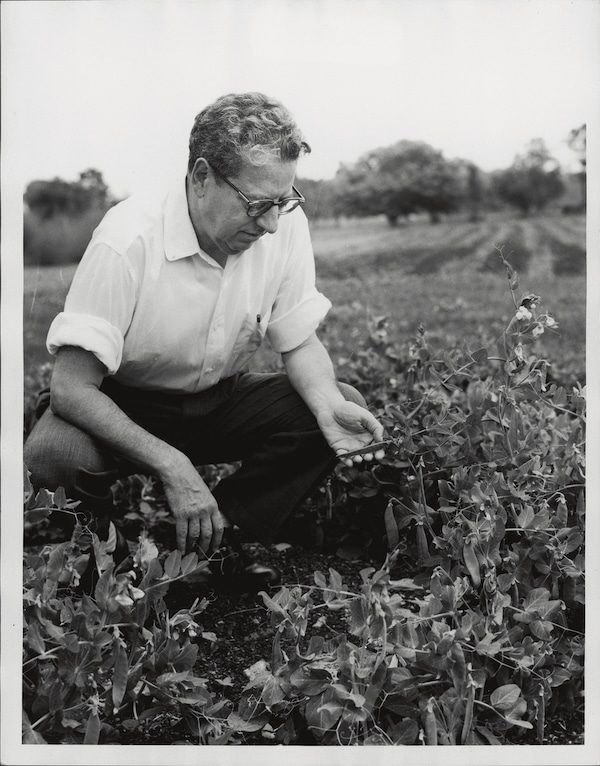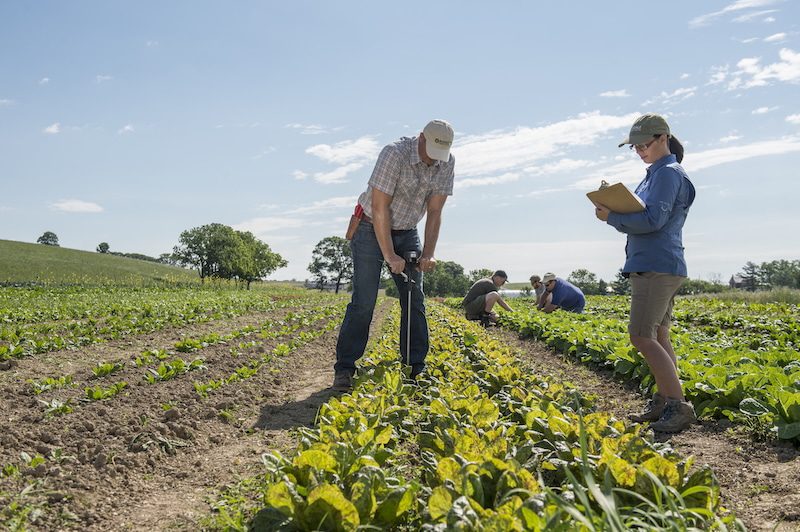Founded
in
1947
by
J.I.
Rodale,
Rodale
Institute
is
a
nonprofit
dedicated
to
helping
the
regenerative
organic
agriculture
movement
grow
through
research,
education
and
farmer
training.
In
his
study
of
regenerative
organic
farming,
Rodale
—
who
came
up
with
the
term
“organic”
—
studied
Indigenous
agricultural
practices,
including
those
of
communities
like
the
long-lived
Hunza
Peoples
of
Northern
Pakistan.
“A
lot
of
people
credit
him
really
with
being
the
preeminent
thinker
and
leader
in
this
modern
day
organic
movement.
J.I.
Rodale
coined
the
term
‘organic’
as
it’s
used
today.
He
started
a
nonprofit
in
1947
and
ironically
the
original
name
for
our
organization
was
the
Soil
and
Health
Foundation,
which
I
find
to
be
so
profound
that
this
man
had
the
vision
to
connect
soil
health
with
human
health,”
CEO
of
Rodale
Institute
Jeff
Tkach
told
EcoWatch
in
an
interview.
“Fast
forward
to
today
—
77
years
later
—
I
think
we
all
know
that
there
is
a
fundamental
disconnect
in
our
society
that
human
beings
are
divorced
and
disconnected
from
their
food
system,
from
nature.
And
I
think
it’s
what’s
leading
to
a
chronic
health
epidemic.
I
think
that
we
all
are
recognizing
that
our
health
begins
in
the
soil,
and
how
we
farm
matters.
And
so
J.I.
Rodale
was
way
out
in
front,
you
know,
doing
that
work.”

CEO
of
Rodale
Institute
Jeff
Tkach.
Rodale
Institute
Before
founding
the
institute,
Rodale
was
an
entrepreneur
who
started
a
company
with
his
brother
in
New
York
City.
“He
came
from
poverty,
but
one
of
the
challenges
in
his
life
was
his
health.
He
came
from
a
lineage
where
his
father
and
his
uncles
didn’t
live
past
the
age
of
57.
And
when
he
and
his
brother
began
to
accumulate
enough
wealth,
they
decided
to
move
their
business
out
of
New
York
City
to
rural
Pennsylvania
and
he
bought
a
farm,”
Tkach
told
EcoWatch.
“He
had
never
farmed
a
day
in
his
life.
And
he
just
had
this
sense
that
if
he
could
control
his
food
and
where
his
food
came
from
and
how
his
food
was
produced
that
it
would
have
an
impact
on
his
longevity.
So
he
bought
a
40-acre
farm
in
Lehigh
County,
Pennsylvania,
outside
of
Allentown,
and
started
talking
to
all
the
experts
in
farming.”

J.I.
Rodale.
Photo
courtesy
of
the
Rodale
family
After
starting
his
farm
in
Pennsylvania,
Rodale
became
curious
about
how
the
chemicals
that
were
being
used
in
agriculture
after
World
War
II
were
impacting
the
food
people
were
eating.
“The
representatives
at
the
land
grant
universities
like
Penn
State
and
Rutgers
and
Cornell…
were
all
telling
him
about
this
amazing
innovation
in
farming
called
chemical
agriculture,
[but]
no
one
could
really
sufficiently
answer
his
question
around
how
those
chemicals
could
yield
healthy
food.
So
he
started
looking
to
Indigenous
populations,”
Tkach
told
EcoWatch.
“He
was
very
concerned
around
where
agriculture
was
headed
if
we
stopped
considering
the
power
of
nature…
I
think
that
was
really
his
concern,
that
we
were
going
to
lose
sight
of
the
miracle
of
nature
to
heal
us,
to
feed
us,
to
nourish
us
in
the
name
of
innovation.”
Rodale
Institute
offers
science
programs
and
direct
farmer
support
to
facilitate
change
in
food
production
and
farming
globally.
“As
the
birthplace
of
the
modern
Organic
movement,
Rodale
Institute
is
filling
the
massive
void
of
American
land-grant
institutions
by
revolutionizing
farming
and
aiming
to
fix
what
is
broken
in
our
food
system,”
a
press
release
from
the
institute
said.
Rodale
Institute
co-founded
the
“regenerative
organic”
certification,
which
is
the
food
industry’s
highest
standard.
For
40
years,
the
institute’s
farming
educational
and
consulting
programs
—
Farming
Systems
Trial
—
have
been
equipping
thousands
of
farmers
in
the
United
States
with
the
resources
and
knowledge
they
need
to
adopt
regenerative
organic
agricultural
practices.
U.S.
consumer
demand
for
certified
organic
products
currently
exceeds
supply,
which
makes
organic
farming
a
potentially
economically
viable
option
for
small
and
large
farms.
Rodale
Institute
is
planning
to
transition
a
million
acres
of
farmland
to
regenerative
organic
agriculture
in
the
next
decade.
“We’ve
just
contracted
with
Organic
Valley,
and
we’re
working
with
a
select
number
of
their
farmers
to
help
them
adopt
organic
practices
and
to
do
it
more
effectively,
as
well
as
to
be
able
to
help
connect
those
farmers
with
more
lucrative
markets,
so
that
they
have
a
place
to
sell
their
crops
at
the
highest
value,”
Tkach
told
EcoWatch.
Tkach
said
one
of
the
roles
Rodale
Institute
plays
is
assisting
farmers
with
the
barriers
they
face
when
transitioning
to
organic.
“‘Where
am
I
going
to
sell
my
crop?
How
am
I
going
to
effectively
embrace
organic
practices?
How
am
I
going
to
overcome
pressures
like
weeds
and
pests?’
All
these
things
that
you
and
I
don’t
think
about,
but
that
farmers
face
every
day,”
Tkach
said.
“So
Rodale
is
stepping
in
to
help
farmers.
And
in
a
lot
of
ways
we’re
acting
as
a
land
grant
on
a
national
scale
for
farmers,
because
our
land
grant
system
does
not
currently
serve
organic
farmers.
So
the
same
challenge
that
J.I.
Rodale
faced
77
years
ago,
many
of
America’s
farmers
still
face
today.”
Rodale
Institute’s
philosophy
is
to
always
keep
moving
things
forward
through
research
and
innovation.
“We
pride
ourselves
in
being
an
innovative
organization,
and
even
though
we’re
77
years
old,
it
feels
like
we’re
a
77
year
old
startup
right
now
because
the
world
has
finally
embraced
what
Rodale
has
been
espousing
for
a
very
long
time,”
Tkach
told
EcoWatch.
“We
see
agriculture
as
a
continuum,
and
we’re
trying
to
help
move
farmers
from
conventional
chemical
farming
down
a
path
towards
embracing
better
and
better,
healthier
agricultural
practices.”
Tkach
said
Rodale
Institute
helps
farmers
make
the
transition
“by
doing
long-term
science.”
“So
I’m
sitting
today
in
my
office,
but
my
office
is
on
a
400-acre
farm.
And
when
I
walk
out
of
my
office,
there’s
research
happening
all
over
our
farm,”
Tkach
said.
“One
study
in
particular
is
a
44-year
study
that
is
the
longest
running
trial
of
its
kind
in
the
world,
where
we’re
studying
organic
and
conventional
grain
cropping
systems,
and
we’re
able
to
look
at
how
these
two
ways
of
farming
are
very
different
and
what
their
long-term
implications
are…
I
think
the
science
is
what
sets
us
apart,
because
there’s
really
no
other
entity
in
North
America
that’s
doing
long-term
research
on
organic
agriculture.”
Tkach
said
the
researchers
are
able
to
demonstrate
that
organic
farming
is
not
only
“more
ecologically
sound”
and
better
for
the
environment,
but
more
profitable
as
well.

The
Rodale
Institute’s
research
team
studies
various
weed
management
practices
in
their
fields
and
in
partnership
with
farmers.
Photo
courtesy
of
Rodale
Institute
“If
you
want
to
heal
the
rural
and
the
urban
divide
and
begin
investing
in
rural
economies,
our
farmers
are
struggling
in
this
country,
they
need
to
improve
their
bottom
line.
And
organic
agriculture
is
driving
between
three
and
six
times
more
profits
for
farmers,”
Tkach
told
EcoWatch.
“Our
science
has
proven
that.”
Tkach
said
regenerative
organic
farming
is
not
just
for
smaller
family-owned
farms,
as
larger
farms
are
embracing
the
practices
as
well.
“Rodale
has
proven
that
organic
regenerative
organic
agriculture
can
be
scaled…
Today,
our
national
network
of
consultants
that
are
Rodale
employees
have
been
called
upon
by
some
of
the
biggest
food
companies
in
the
world,”
Tkach
said.
“One
example
is
General
Mills.
General
Mills
has
recently
hired
Rodale
Institute
as
a
nonprofit
to
go
out
and
work
with
70
farmers
in
the
upper
Midwest
that
are
producing
oats
and
wheat
—
two
of
the
biggest
ingredients
that
General
Mills
grows.”
Tkach
said
the
country’s
need
for
certified
organic
products
is
outpacing
its
supply.
“So
right
now
there
is
a
greater
demand
for
certified
organic
products
in
the
United
States
than
we
can
supply
domestically.
The
U.S.
is
a
net
importer
of
organic
food,”
Tkach
explained.
“During
this
new
administration
I
actually
was
in
DC
five
weeks
ago
meeting
with
House
and
Senate
leaders
of
the
Ag
Committee
and,
frankly,
I
received
support
from
both
sides
of
the
aisle…
So
I
always
say
that
organic
agriculture
is
for
all
of
us.
We
all
eat.
We
all
want
to
live
on
a
healthy
planet.
We
all
want
to
be
healthy.
And
in
order
to
do
that,
we
need
to
come
to
grips
that
our
current
farming
system
is
fundamentally
broken.
We
have
to
transform
agriculture
in
this
country.”
“There’s
something
in
organic
that
every
one
of
us
can
be
excited
about.
If
you
want
to
talk
about
onshoring
our
food
system
and
creating
a
regional
resilient
food
system,
that’s
what
organic
agriculture
can
do
for
us.
If
you
want
to
talk
about
lowering
our
healthcare
costs,
well,
it
starts
with
what
we’re
eating.
Food
is
medicine.
And
Rodale
is
saying
that
healthy
food
starts
in
healthy
soil.
And
healthy
soil
is
birthed
on
organic
farms,”
Tkach
added.
Tkach
said
Rodale
science
has
demonstrated
that
much
of
the
world’s
carbon
emissions
can
be
sequestered
in
the
soil
on
organic
farms.
“How
we
farm
can
actually
become
a
carbon
sink
in
agriculture,”
Tkach
said.
Rodale
Institute
was
recently
named
one
of
the
most
innovative
companies
in
the
world
for
2025
by
the
magazine
Fast
Company.
“I’ve
actually
been
a
reader
of
Fast
Company
for
most
of
my
adult
life…
It’s
a
magazine
about
innovation,”
Tkach
told
EcoWatch.
“My
life
was
deeply
touched
by
their
content
over
the
years…
It
was
a
huge
honor…
It’s
kind
of
hilarious
that
a
77-year-old
company
is
being
named
to
that
list,
but
it’s
a
testament
to
where
we
are
in
the
world
and
how
the
innovation
that
we’ve
been
leading
is
finally
getting
recognized.”
Rodale
is
co-hosting
the
first
Good
Farmer
Award
in
recognition
and
support
of
farmers
who
have
been
using
organic
practices
for
a
decade
or
less.
“We
are
going
to
be
co-hosting
an
award
called
the
Good
Farmer
Award
in
partnership
with
our
brand
partner
Davines…
recognizing
farmers
that
are
at
the
early
part
of
their
journey
and
that
are
looking
for
some
financial
support,”
Tkach
told
EcoWatch.
“Some
of
the
biggest
barriers
for
young
farmers
is
capital.
Farming
is
a
very
capital-intensive
business,
and
Rodale
is
going
to
be
looking
to
honor
and
celebrate
beginning
farmers
who
are
using
organic
and
responsible
practices,
and
we’re
going
to
try
to
award
them
with
some
funding
to
help
get
them
get
their
business
off
the
ground.
So
we’re
really
excited
about
that.”
The
first
recipient
of
the
award
is
Clarenda
“Farmer
Cee”
Stanley.
“The
award
recognizes
outstanding
farmers
making
positive
environmental
and
social
contributions
to
agriculture
through
regenerative
organic
practices,”
a
press
release
from
Rodale
Institute
and
Davines
Group
said.
“Clarenda
Stanley,
founder
and
CEO
of
Green
Heffa
Farms
in
North
Carolina,
stood
out
for
her
commitment
to
economic
empowerment,
education,
equity,
and
ecological
stewardship.”
I
asked
Tkach
what
individuals
can
do
to
support
regenerative
organic
farming
in
the
U.S.
“Right
now,
the
word
regenerative
is
being
co-opted
and
greenwashed
by
the
biggest
food
companies
in
the
world.
When
we
talk
about
regenerative
farming
in
and
of
itself,
that
means
everything
and
nothing,”
Tkach
told
EcoWatch.
“But
Rodale
helped
to
co-found
the
newest
and
highest
bar
certification
in
the
food
industry:
regenorganic.org.
That
is
what
all
consumers
should
be
supporting.
They
should
be
looking
for
foods
that
have
both
the
USDA
organic
and
regenerative
organic
label
on
them,
and
supporting
those
farmers
and
those
brands,
because
that’s
the
kind
of
food
system
we’re
trying
to
usher
in.”
“Robert
Rodale,
the
founder
of
the
Rodale
Institute’s
son,
actually
coined
the
term
regenerative
farming
in
the
1970s.
And
he
believed
that
we
regenerate
when
we
begin
to
farm
in
a
regenerative
way.
We
start
by
healing
the
soil,
but
everything
else
in
that
system
improves
over
time,”
Tkach
said.
“And
so
we’re
asking
consumers
to
participate
in
a
better
food
system.”
Tkach
recommended
that,
in
addition
to
supporting
the
certifications
and
brands,
every
consumer
should
“get
to
know
a
farmer.”
“We
all
should
have
a
relationship
with
someone
in
our
community
that
is
growing
healthy
food
and
we
should
support
them,”
Tkach
said.
“If
you’re
even
more
courageous
and
adventurous,
I
always
tell
people
they
should
try
to
plant
something,
you
know,
just
grow
one
thing,
whether
it’s
a
potted
plant
on
your
windowsill
or
a
raised
bed
garden…
we
all
should
become
farmers
and
stewards
of
the
earth.”
“The
rhythm
of
nature
changes
you.
It
deepens
your
human
experience,
and
it
makes
you
a
better
human.
And
I
think
it
starts
with
food,”
he
said.
Educational
materials
and
resources
on
organic
farming
—
including
free
webinars
and
courses
—
are
available
on
Rodale
Institute’s
website.
“If
we’re
talking
about
a
win
that
everyone
can
get
behind,
it’s
organic
farming.
And
it’s
not
a
polarizing
topic.
It’s
something
that
we
can
all
agree
on,”
Tkach
said.





